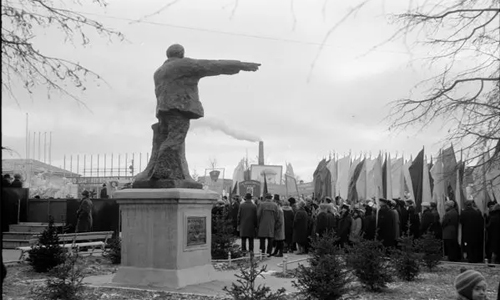When Russia was full of hope
On a crisp afternoon last month, a couple hundred people gathered on the main square of this small town a few hours north of Moscow to witness a historic event: the unearthing of a letter written half a century ago in Soviet Pereslavl to the youth of 2018. The letter, written by young people in 1968, had been sealed in a metal cylinder shaped like a rocket — no doubt in homage to Yuri Gagarin’s triumphant venture into space, which took place six months before the capsule was buried under a small gray pedestal.
Photos from the 1968 ceremony show locals bundled in coats and quilted jackets under the square’s statue of Vladimir Lenin, his disproportionately long arm pointing over their heads toward the undoubtedly bright communist future in the 21st century. “We bequeath to you the ardent love for the great leader of the working class Vladimir Lenin,” the letter says. “Create a beautiful monument to Vladimir Ilyich, the palace of Communism, a great and worthy manifestation of his immortal ideas!” Fifty years later, Russia under President Vladimir Putin looks pretty different from what Lenin or his followers imagined.
The Pereslavl Lenin himself suffered an unfortunate fate a year ago, when construction workers rebuilding the square knocked off his arm and then encased the one-armed body in a plywood box. A sign on the box now denotes the traditional “location” of Vladimir Ilyich, a 1929 monument under state protection. Locals aren’t certain he is still inside. Letters to the future were a widespread phenomenon in the Soviet Union in 1967 and ’68. Those years were characterized for the Soviet masses by the fantasy of space exploration and the introduction of the two-day weekend, the first time since World War II that workers didn’t have to work six days a week.
The letters were written to commemorate a half century since the 1917 revolution and the establishment a year later of the Komsomol, the All-Union Leninist Young Communist League. They reflected the dream of a more comfortable future, one where ordinary people could finally enjoy the fruits of grueling labor of generations before them. “You work and live in a Communist society which we have begun to build, our generation: the pupil of Lenin’s Komsomol, Yuri Alexeyevich Gagarin unveiled the first space routes, while you fly to other planets,” says a handwritten letter unveiled in October in Sedelnikovo, a Siberian village. “We are building, building, building,” reads a letter in the city of Tobolsk, listing hardships during construction of a railroad through the swamps to western Siberia’s oil fields.
“We believe that in 2018 people will be safe from war and hunger. The world will be more just than it is today and there will be no capitalists left.” Unveiling and reading these letters over the past two years, as the quality of life for most Russians declines, has inspired bittersweet contemplation. While the two-day weekend is still around, another institution of the Soviet era, the state pension, has taken a hit: A reform pushed by Putin will raise the retirement age next year to 60 from 55 for women and to 65 from 60 for men.
(These reforms have been especially unpopular and are widely believed to be responsible for a sharp decline in the popularity of United Russia, the majority party, and of Putin himself.) The remnants of other benefits of the Soviet welfare state — like free health care and education — continue going through “optimization,” the preferred Russian euphemism for budget cuts. The sense of injustice is rising, especially outside big cities. Even the optimistic television coverage of a new bridge to Crimea and the reports of military victories in Syria are showing signs of wear.
A study by the Institute of Sociology by the Russian Academy of Sciences published this month found that Russians’ priorities have changed since late 2014, when many celebrated the annexation of Crimea. Today, more people believe that projecting great power and military might is less important than a fair society and people’s well-being. Russians may have given up the idea of Communism and a government of workers and peasants, but they still want the state to ensure their economic survival. Despite Putin’s proclamations about economic growth, analysis shows that Russians are increasingly pessimistic.
An October study by the Higher School of Economics found that consumer confidence has fallen sharply. Despite economic growth over the past two years, rising oil prices and macroeconomic stability (if we are to believe official state statistics) have not provided much relief to the average household. In fact, Russians are more jaded than ever. The Kremlin has tried to contain public dissatisfaction by appointing a flock of new governors this fall, but micromanaging the
Related Posts

